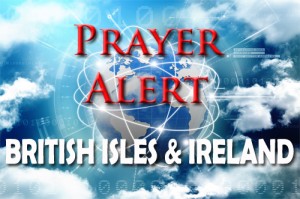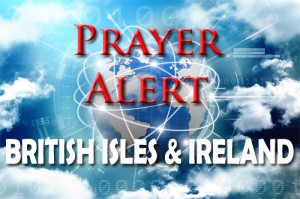Displaying items by tag: Government
Speak out for persecuted Christians at local hustings
The General Election is an excellent opportunity to put the cause of persecuted Christians on the agenda of your election candidates - and ultimately your future MP. You can do this by asking a question about freedom of religion or belief at your local hustings (events where election candidates debate policies and answer questions from potential voters). Hustings are organised by a range of community groups, including many churches. The following are a few suggested questions to use: If you become an MP, how will you engage with issues of international freedom of religion or belief? If your party forms the next government, in which ways will it stand up for freedom of religion or belief around the world? What are your party's plans for protecting the right to freedom of religion or belief in the government’s foreign policy and aid strategy? You can download and print these and other questions at:
Iran: what people think of today’s election
Iran’s presidential election today is seen as a referendum on Hassan Rouhani’s outreach to Western nations and his nuclear deal with world powers. The following are comments by some Tehran residents: ‘- I decided not to vote; candidates do not consider the future of our youth. - People have difficulty making a living. - I will not vote, I do not know any of these candidates and I do not trust any of them. - Voting or not voting will not make any difference. - I vote because of Israel, Saudi Arabia and the enemies around my country. - The biggest challenge of Iran is the mismanagement. If the president stops the reckless use of people’s assets by officials, it is possible to improve the situation. - 80% of the young people I know are jobless even though they hold master’s degrees. - Voting is a way of showing our protest to the heads of the ruling system.’
USA: growing sense of crisis
Escalating events: -President Putin claims to have records of the meeting between Russian foreign minister Sergey Lavrov and President Trump. -Reports that Trump asked former FBI director James Comey to drop an investigation into the former national security adviser Michael Flynn’s links to Russia. -The White House denies there was ever a Trump/Comey meeting. -Israel emerges as supplying sensitive security intelligence to Trump. -Trump shared the material with Russia. -Trump fired Comey, who was leading investigative links between the Trump campaign and Russia. -The New York Times cited a memo Comey wrote about his meeting with Trump in February. Did the US president try to influence an FBI investigation? Now former prosecutor and FBI director Robert Mueller will oversee an independent inquiry into ‘Russia,/Trump true/fake news’. Democrats and Republicans agree that Mueller ‘has a history of standing up to the White House’. Meanwhile, the Washington Post reports Trump growing increasingly angry with staff; some have turned to impeachment gallows humour, some are contacting consultants and circulating their CVs . See:
Nigeria: Chibok girls - what awaits the ones set free?
The ordeal of being kidnapped by Boko Haram does not end with their release. It is the start of a long struggle back into family and community life. The Chibok ‘children’ who have been freed are now young women. An already fraught transition from adolescence to womanhood has been complicated by their captivity. They will be reunited briefly with families over the coming days. There will be tearful reunions and a mixture of emotions, as both parents and daughters will have changed a great deal over the past three years. Then the young women will go through a process of reintegration or rehabilitation. This is either government care or government custody, depending on the need. Some families support the process;, others are angry that they will not have their daughters back even after they have been released from Boko Haram.
Hamas' new leader
It was announced last Saturday that Ismail Haniyeh had won the movement’s internal elections, and that he is the new head of its political bureau. Haniyeh, who lives in Gaza, is widely popular among the Palestinians. A political science professor in Nablus said that Haniyeh has an ability to address the Palestinians; most importantly, he will bring the movement closer to Iran through efforts by senior Hamas leaders. He will revive reconciliation with Hezbollah and Syria, working on resolving the negativity that harmed Hamas’ relationship with these parties in the past. Difficult challenges await Haniyeh, such as achieving reconciliation with Fatah, restoring Hamas' relations with countries such as Egypt and Iran, easing the Israeli siege on the Gaza Strip, and keeping the spectre of war out of Gaza.
Maldives: rising extremism
Behind the facade of a ‘tropical paradise’ are tragic realities: the highest divorce rate in the world, rising crime, widespread child abuse, pervasive drug use and over 200 young people joining IS. All citizens are required to be Muslim. There are no churches, and there is no official access to God’s Word. The Gospel of Luke and Acts are currently available in Dhivehi, but are not permitted to enter the country. No mission work or Christian literature has ever been legally allowed within the islands. Widespread traditional beliefs in spirits combined with Islam leave many almost entirely untouched by the Gospel, trapped in fear and without access to Jesus. Pray for miraculous opportunities for Maldivians to hear the Gospel, and that the government's attempts to silence it may instead raise up a Maldivian church.
Global: elections in six countries in May
The UK is not the only country preparing for an election. On 4 May, Algeria’s parliamentary poll will be the first since the legislature adopted landmark constitutional reforms last year. France’s second round of voting, on 7 May, could trigger colossal changes in European politics. South Korea, in the world's most volatile region, has a presidential election on 9 May following the impeachment of President Park Geun-hye. Politics in the Bahamas is expected to become nastier, dirtier, and crazier ahead of the election on 10 May, after questions over lucrative brokerage, trucking, and limousine contracts. On 19 May Iranians go to the polls (see below), and on 24 May the Cayman Islands will be voting. Many of these nations desperately need change. When people pray, God answers; may He bring judgment and promotion where he deems it should be in the coming months.
Iran: election on 19 May
Ethnic Persians are born Muslim. It is illegal to run Christian activities in Farsi, the national language. Despite this, Christians from a Muslim background make up the largest group of Christians in Iran. A few years ago International Freedom of Religion or Belief reported, ‘There was cautious optimism when Hassan Rouhani became president that his influence would soften harsh policies toward religious and ethnic minorities. Sadly, his moderate language has not translated into any meaningful improvement.’ Since he is aiming for another term in office, many believe that next month’s elections pose an ultimate vote of confidence. Pray for political changes in Iran that will allow for freedom of religion. A Persian who leaves Islam can be sentenced to death if male, and life imprisonment if female. For many Muslim families, it is a disgrace when a family member converts. Pray for protection and provision for Christians who have been cursed and disowned by their families. See also:
Theresa May - speak freely about faith in Christ
During Theresa May’s Easter message, she talked about religious freedom and said people should be able to talk freely about their faith, including their faith in Jesus Christ. She urged everyone to uphold the country's ‘strong tradition’ of religious tolerance and freedom of speech. ‘We must continue to ensure that people feel able to speak about their faith, and that absolutely includes their faith in Christ. We must be mindful of Christians and religious minorities around the world who do not enjoy these same freedoms, but who practise their religion in secret and often in fear.’ She added, ‘People should be confident about Christianity's role in the country.’ Alastair Campbell, editor-at-large of the New European, said the prime minister should be careful about merging her faith with her politics.
Christians urged to help shape our country's future
The Evangelical Alliance (EA) has called on Christians to 'fully engage' in the general election and speak hopefully with vision for the future. They will release resources to help churches discuss the opportunities and challenges facing society, structured around the themes of love, freedom, justice and truth. Steve Clifford, EA’s general director, said that this election provides a chance for Christians to take part in debating the future of our society. ‘It’s a chance for us to speak hope into a society that is so often searching for meaning. Between now and 8 June we can consider what the political parties are proposing, and the vision they are offering for our society. We can have a society that is more loving than it is now, we can live in greater freedom than we currently know, we can see justice as a lifestyle and not a soundbite, and rediscover the power of truth as the basis of a society working for the common good.’









